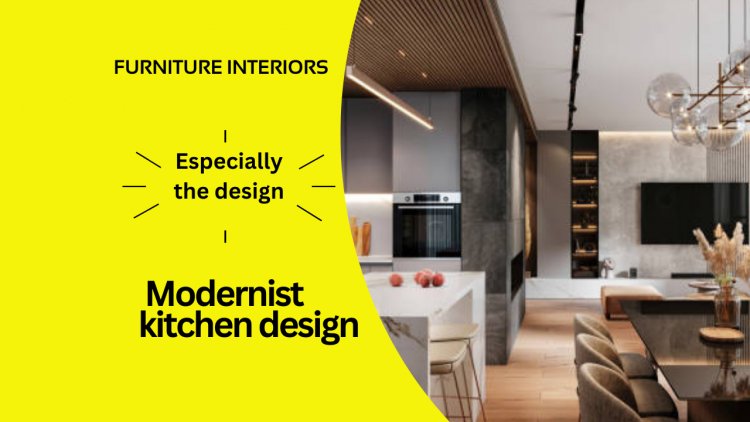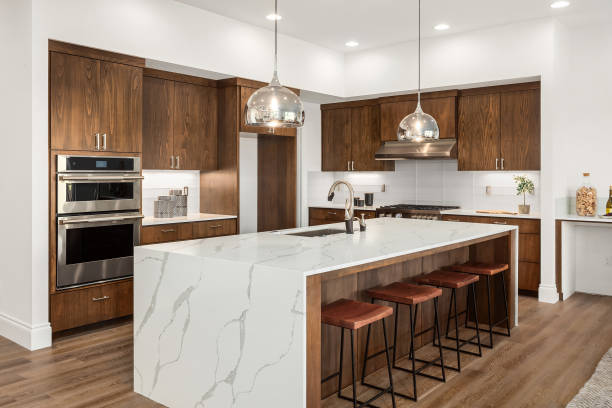Modernist Kitchen Design Trends: Elevate Your Culinary Experience
Discover Modernist Kitchen Design principles that emphasize simplicity, functionality, and style for your culinary space.

Modernist Kitchen Design: Embrace Simplicity and Functionality
What is Modernist Kitchen Design?
Definition and Characteristics
Modernist kitchen design embodies the principles of simplicity, functionality, and minimalism. This style emphasizes clean lines, geometric shapes, and a lack of ornamentation, creating a serene and organized environment. The focus is on the kitchen as a space for cooking and socializing, where aesthetics are intertwined with practicality.

Historical Context
The roots of modernist design can be traced back to the early 20th century, influenced by movements like Bauhaus and De Stijl. Pioneers such as Le Corbusier and Mies van der Rohe championed the idea that form should follow function, leading to kitchens that prioritize usability without sacrificing beauty. As a result, modernist kitchens are designed to enhance the cooking experience while providing a visually cohesive space.
Key Elements of Modernist Kitchen Design
Clean Lines and Geometric Shapes
At the core of modernist kitchen design is the use of clean lines and geometric shapes. This principle is reflected in everything from cabinetry to countertops. For example, flat-front cabinets without handles create a seamless look, while angular islands can serve as a focal point in the kitchen. These elements work together to create an uncluttered and streamlined appearance, essential for modernist aesthetics.

Color Palette
The color palette in modernist kitchens typically consists of neutral tones, monochromatic schemes, and occasional bold accents. Shades like white, gray, and black dominate, providing a versatile backdrop that enhances natural light and creates an open feel. For a pop of color, vibrant hues can be introduced through accessories or feature walls, maintaining the modernist ethos without overwhelming the design.
Materials and Textures
Modernist kitchen design often incorporates a mix of materials, such as stainless steel, glass, and concrete. These materials not only provide durability but also enhance the kitchen's aesthetic. Textures play a vital role, with smooth surfaces creating contrast against rough or matte finishes. For instance, a polished concrete countertop paired with matte cabinetry can create a striking visual dynamic.

Functional Layouts
Efficiency is paramount in modernist kitchens, and this is reflected in their layouts. Popular configurations include open-concept designs that promote a sense of spaciousness and encourage social interaction. The work triangle—connecting the refrigerator, stove, and sink—is often optimized to ensure seamless movement throughout the kitchen. Island layouts are also common, providing additional workspace and serving as a central gathering point.
Innovative Appliances
Modernist kitchens are equipped with the latest appliances designed for efficiency and style. Sleek, stainless steel appliances integrate seamlessly with cabinetry, creating a cohesive look. Smart technology is increasingly incorporated, allowing for automated features that enhance convenience. From touchless faucets to smart ovens, these innovations make cooking and cleanup more manageable while maintaining the minimalist aesthetic.

Designing Your Modernist Kitchen
Planning the Layout
When designing a modernist kitchen, planning the layout is crucial for functionality. Consider the flow of movement, ensuring that the work triangle is efficient. Open layouts are favored, allowing for easy transitions between cooking, dining, and entertaining areas. Use islands to separate spaces without creating barriers, fostering a sense of openness and connectivity.

Selecting Furniture and Fixtures
Choosing furniture that complements modernist design is essential. Opt for pieces with clean lines and minimal ornamentation. Dining tables and chairs should reflect the overall aesthetic while being comfortable and functional. Fixtures, such as faucets and lighting, should be sleek and modern, enhancing the kitchen’s visual appeal without overwhelming the design.
Personalizing Your Space
Infusing your personal style into a modernist kitchen can be achieved through thoughtful decor choices. Incorporate artwork, decorative items, or plants that resonate with you, ensuring they align with the overall design ethos. Open shelving can showcase personal items, while still maintaining a clean and organized look. Remember, balance is key—choose a few statement pieces rather than overcrowding the space.

Trends in Modernist Kitchen Design
Sustainable and Eco-Friendly Designs
As homeowners increasingly prioritize sustainability, modernist kitchen designs are embracing eco-friendly materials and practices. Options like reclaimed wood cabinetry, bamboo flooring, and energy-efficient appliances not only contribute to a stylish kitchen but also minimize environmental impact. Incorporating these elements reflects a commitment to sustainability while adhering to modernist principles.
Smart Kitchen Technology
The integration of smart technology is a growing trend in modernist kitchens. Devices such as smart refrigerators, automated lighting systems, and voice-controlled assistants enhance convenience and efficiency. These technologies make daily tasks easier and allow for greater control over kitchen environments, aligning perfectly with the modernist focus on functionality.

Open-Concept Living Spaces
Open-concept designs continue to dominate modernist homes, providing a seamless flow between the kitchen, dining, and living areas. This trend promotes social interaction and makes spaces feel larger. In a modernist kitchen, creating a cohesive look between these areas is essential. Use consistent materials and color schemes to ensure a harmonious transition between spaces.
Conclusion
Modernist kitchen design is an ideal choice for homeowners seeking a space that embodies simplicity, functionality, and elegance. By focusing on clean lines, efficient layouts, and innovative materials, you can create a kitchen that not only meets your practical needs but also serves as a stunning visual centerpiece in your home. Whether you are renovating an existing kitchen or designing a new one, embracing the principles of modernist design can result in a space that is both beautiful and highly functional.
FAQs about Modernist Kitchen Design
What defines modernist kitchen design?
Modernist kitchen design is characterized by simplicity, functionality, clean lines, and a lack of ornamentation, focusing on practicality and aesthetics.
How can I incorporate modernist design in a small kitchen?
Maximize space by choosing compact, multi-functional furniture and fixtures. Use light colors to create a sense of openness, and opt for minimalist cabinetry to avoid clutter.
Are modernist kitchens practical for everyday use?
Yes, modernist kitchens are designed with functionality in mind. Their layouts, materials, and innovative appliances all contribute to efficiency and ease of use.
What materials are best for a modernist kitchen?
Common materials include stainless steel, glass, concrete, and natural woods. These materials offer durability and aesthetic appeal while complementing modernist design principles.
How can I personalize a modernist kitchen?
To personalize a modernist kitchen, incorporate art, plants, or unique decorative items that reflect your style. Balance these elements with the overall minimalist design to maintain cohesion.
What's Your Reaction?
















